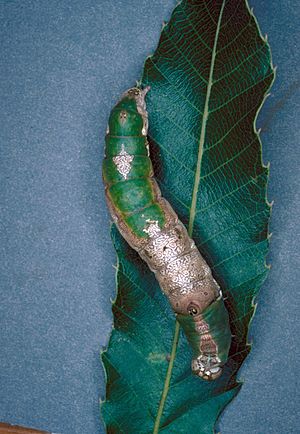White-streaked prominent moth facts for kids
Quick facts for kids White-streaked prominent moth |
|
|---|---|
 |
|
| Oligocentria lignicolor larva | |
| Scientific classification | |
| Kingdom: | |
| Phylum: | |
| Class: | |
| Order: | |
| Family: |
Notodontidae
|
| Genus: |
Oligocentria
|
| Species: |
O. lignicolor
|
| Binomial name | |
| Oligocentria lignicolor (Walker, 1855)
|
|
| Synonyms | |
|
|
The Oligocentria lignicolor, also known as the white-streaked prominent moth or lacecapped caterpillar, is a fascinating insect. It belongs to the Notodontidae family, which includes many types of moths. You can find this moth in various parts of North America.
Contents
Meet the White-Streaked Prominent Moth
This moth has a couple of cool common names. "White-streaked prominent moth" describes its adult appearance. The name "lacecapped caterpillar" refers to its unique larval stage. These moths are an important part of their local ecosystems.
Where Does It Live?
The white-streaked prominent moth makes its home across a wide area. It lives in many places in North America. This includes states like Connecticut, Georgia, Illinois, Louisiana, Massachusetts, Mississippi, Missouri, New Jersey, New York, North Carolina, Oklahoma, and Pennsylvania. It is also found in New Brunswick, Canada.
What Does It Look Like?
The adult white-streaked prominent moth is not very big. Its wingspan is usually around 38 millimeters (about 1.5 inches). This is roughly the length of a small paperclip.
The caterpillars look quite different from the adult moths. When they are young, they are yellow and like to stay together in groups. As they grow bigger, they reach about 45 millimeters long. At this stage, their bodies become a mix of green, white, and brown blotches and spots. This coloring helps them blend in with the leaves they eat.
The Caterpillar's Life
The caterpillars of the white-streaked prominent moth are very hungry! They mostly eat the leaves of certain trees. Their favorite meals come from Fagus trees, Castanea trees, and Quercus trees. These caterpillars are quite neat eaters. They prefer to munch along the edges of the leaves.
When they are young, these caterpillars are "gregarious." This means they like to hang out together in groups. As they get older and bigger, they might become more independent. Their feeding habits are important for the health of the trees they live on.
Images for kids



